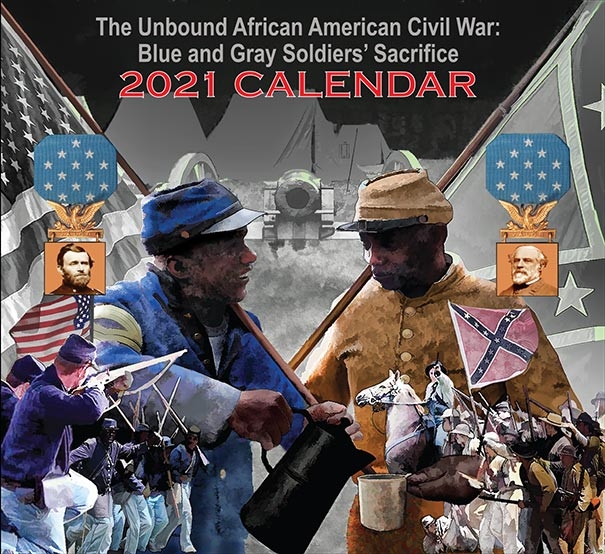CSA Buried Treasures 2019 Calendar
$10.00
Please click on the image to view it in full screen.
Please get your Newson Publishing’s CSA 2019 battlefield calendar
The real issue with me as an African-American is what northern historians are implying about the southern Afro-American male; In the heat of battle Black People, he becomes meek and cowardly in nature.
When southern white Confederate soldiers were surrounded by death, Afro-Americans who may have accompanied them as childhood friends or as body servants etc., had no concerns about northern Yankee soldiers raping there wives, children and burning there homes, the southern Afro-American male slave was a coward to the core, and only the Afro-Americans slave that escape to the north, joined their armies, who were ill-trained and used as shock troops were the only blacks heroic in the American Civil War.
Who is defined as a soldier, a clarification of terms is helpful.
Gen. August Kautz, in his 1864 Customs of Service for Officers of the Army: As Derived from Law and Regulations and Practiced in the United States Army, offers a very broad definition. In the fullest sense, any man in the military service who receives pay, whether sworn in or not, is a soldier, because he is subject to military law. Under this general head, laborers, teamsters, sutlers, chaplains are soldiers. At the end of the war, the Confederate Afro-Americans soldier received a pension for their participation as soldiers.
Most scholars have avoided the difficult task of linking any blacks to the Southern war effort, most scholars are simply afraid of confronting this great historical political paradox.
Did Afro-American actually serve in active combat on behalf of the South? YES.
Did Afro-American soldiers actually carry muskets and shoot at the northern Union soldiers? YES
A newspaper correspondent from the New Orleans Daily Crescent, reporting on one of the early battles of the war stated that a servant named Levin Graham refused to stay in camp during a fight, “but obtained a musket, fought manfully, and killed four of the Yankees himself.”
The first Union officer to be killed in battle was an abolitionist named Theodore Winthrop. Winthrop, a union major on General B. F. Butler’s staff, was killed at Big Bethel on June 1861. What makes this death even more significant is the fact that he was killed by Sam Ashe, a black body servant to a Confederate soldier in a Company of the 3rd Virginia Infantry called the Wythe Rifles.
Records show that New York officers on patrol reported being attacked near New Market Bridge close to Big Bethel by Confederate cavalry and a group of 700-armed blacks on December 22, 1861. The Northerners killed six of the blacks before retreating; officers later swore affidavits stating that they were attacked by blacks, and later complained: “If they fight with Negroes, why should we not fight with them too?”
As an artist-writer and if I was a slave during that time. I would rather fight for the devil I do know then go fight for the devil I don’t know


